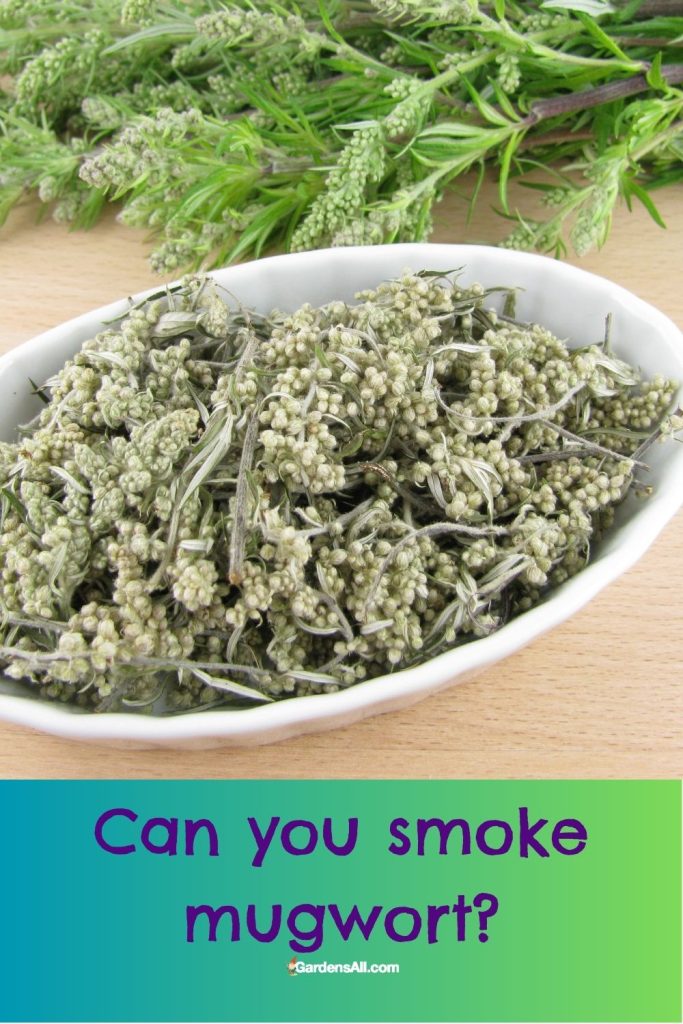While it is possible to smoke mugwort (Artemisia vulgaris), it is important to note that there can be hazards associated with smoking any substance. So in this article on smoking mugwort benefits and hazards, we cover some pros, cons, and alternatives.
CAUTION: Mugwort is in the Asteraceae (daisy) family, which is the same family as ragweed. So if you have an allergy to ragweed, you may also be affected by mugwort, so proceed with appropriate caution and care.
Smoking Mugwort
Pros
- Relaxation: Mugwort smoke may promote relaxation and reduce stress levels.
- Dreams: Mugwort is believed to enhance dream experiences, and smoking it may lead to vivid, lucid dreams.
- Respiratory benefits: Mugwort contains compounds that have expectorant properties and may help to clear the respiratory system.
You can see more extensive information in this article on proven medicinal mugwort benefits and uses.
Cons
- Respiratory problems: While mugwort has respiratory soothing properties, smoking any substance can irritate the lungs and lead to respiratory problems.
- Allergic reactions: Mugwort can cause allergic reactions in some individuals, and smoking it may increase the risk of an allergic reaction.
- Toxicity: Mugwort contains thujone, a compound that can be toxic in high doses, and smoking it may increase the risk of thujone toxicity.
- Interaction with medication: to smoke mugwort may interact with certain medications, including sedatives, antidepressants, and antipsychotics.
Overall, it is not a recommended to smoke mugwort as there are better method of using the herb for medicinal purposes. While mugwort does not contain most of the harmful compounds found in cigarettes, even at higher concentrations than with tobacco, smoking in general, is known to be detrimental to the lungs.
Inhaling smoke from any substance can cause respiratory problems and increase the risk of lung cancer. If you are interested in using mugwort for its medicinal properties, there are safer ways to obtain the benefits of mugwort, such as drinking mugwort tea, mugwort tinctures, steeped mugwort steam inhalations, or using it topically.
If you are interested in using mugwort for medicinal purposes, it is important to consult with a healthcare professional before doing so to ensure that it is safe and appropriate for you.
We favor mugwort tea and also steam inhalation.
Mugwort Steam Inhalation to Sooth the Respiratory Tract
Mugwort steam inhalation is a traditional herbal remedy used for respiratory problems, such as coughs, colds, and sinus congestion.
You can go modern and use an electric steam inhaler, or you can do the old fashioned towel-over-pot method. If you use the pot of boiling water, just be sure to test with your hand hovering over the pot first to be sure the water is cool enough for the steam to not burn as you lean your face over the pot of herbs.
Here are the steps to use mugwort in the pot steam inhalation method:
- Take a handful of dried mugwort leaves and place them in a large pot of boiling water.
- Lower the heat and let the mixture simmer, covered, for 10-15 minutes.
- Remove the pot from the heat and remove the lid. Let it cool for a few minutes, until not too hot for a hand hovering over the pot.
- Place a towel over your head and lean over the pot, slowly lowering toward the steam to the point of comfort, making sure your face is not too close to the water.
- Breathe in the steam for 10-15 minutes, taking deep breaths through your nose.
- After the inhalation, blow your nose and rinse your face with cool water.
CAUTION: Be careful not to burn yourself with the hot water or steam, and do not inhale too close to the water as it can cause burns or scalds. If you experience any discomfort or adverse reactions, stop the treatment and seek medical advice.
Additionally, mugwort is not recommended for use during pregnancy or breastfeeding, and it can cause allergic reactions in some people. It is always best to consult with a healthcare provider before trying any new herbal remedies.

I’m LeAura Alderson, a garden, herb and plant enthusiast with a passion for discovering the many edible and medicinal benefits of the plants all around us, including the weeds! I’m a writer, editor and media publisher for our family of websites.
While I was certified in fitness and life coaching, I am NOT a health practitioner. However, I’m a lifelong health enthusiast, with a keen interest in healthy, organic foods and making home remedies and the content we share is from our own experience and usage as well as that extracted from scientific research so that you can explore further on your own.
Always seek the advice and guidance of your health practitioners first and foremost.
As a family we’re steadily expanding our gardening, experimentation and knowledge around all things gardening, edible landscaping, fresh organic foods and self sustainability with farming in our future. I also own and manage iCreateDaily.com, a site all about transformation through creation, and the power of positivity, optimism and mindset.

